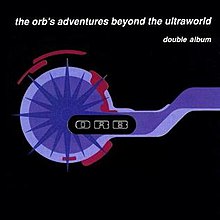The Orb's Adventures Beyond the Ultraworld
| The Orb's Adventures Beyond the Ultraworld | ||||
|---|---|---|---|---|
 |
||||
| Studio album by The Orb | ||||
| Released | 2 April 1991 | |||
| Studio | Do Not Erase, London; Marcus Studios, London; Berwick Street Studio, London; Trancentral, London | |||
| Genre | Ambient house, dub, breakbeat | |||
| Length | 109:41 | |||
| Label | Big Life | |||
| Producer | Alex Paterson, Andy Falconer, Kris Weston | |||
| The Orb chronology | ||||
|
||||
| Singles from The Orb's Adventures Beyond the Ultraworld | ||||
|
||||
| Alternate cover | ||||

Cover for original US release
|
||||
| Professional ratings | |
|---|---|
| Review scores | |
| Source | Rating |
| AllMusic | |
| Encyclopedia of Popular Music | |
| NME | 8/10 |
| The Rolling Stone Album Guide | |
| Slant Magazine | |
| Spin Alternative Record Guide | 9/10 |
The Orb's Adventures Beyond the Ultraworld is the debut studio album by English electronic music group The Orb. Released in April 1991, the double album is a continuous progressive composition consisting of several tracks advancing the "journey" concept. The album's framework is of a two-hour psychedelic trip through music genres and studio electronics, produced to "push the threshold" of live stage performance, and comprising vocal samples and sound effects interspersed with original music.
Three versions of The Orb's Adventures Beyond the Ultraworld were released: the original, two disc 109:41-minute UK release, also used for the US cassette edition; a 70:41-minute, single disc US release; and a 182:05-minute UK deluxe edition three disc reissue that was released in mid-2006.
The Orb have always primarily been composed of one individual, Alex Paterson, along with numerous and varied individuals assisting throughout the group's recording career. Paterson began his music career in the 1980s as a roadie for the post-punk band Killing Joke before eventually leaving in 1986 to pursue his own musical interests, influenced by the growing popularity of Chicago house music in England during the decade, and shortly thereafter began working with another ambient house pioneer, Jimmy Cauty, who had been involved in the Killing Joke side-project Brilliant. Paterson also performed chillout DJ sets in Paul Oakenfold's Land of Oz night in the club Heaven, which included collaborations with Cauty. Paterson said of these events:
"We'd build melodies up by overdubbing and mixing multiple tracks and then take an eight-track, or was it a twelve-track, into Heaven, just linking it up to three decks, loads of CD players, loads of cassettes... we used to keep it very, very quiet. We never used to play any drums in there. It'd be, just like, you know, BBC sound effects, really... four or five hours playing really early dub reggae... For All Mankind. We had white screens so we could put up visuals as well. We had home movies of ducks in the park. We'd go for everything. It was all layering on top of each other."
...
Wikipedia
